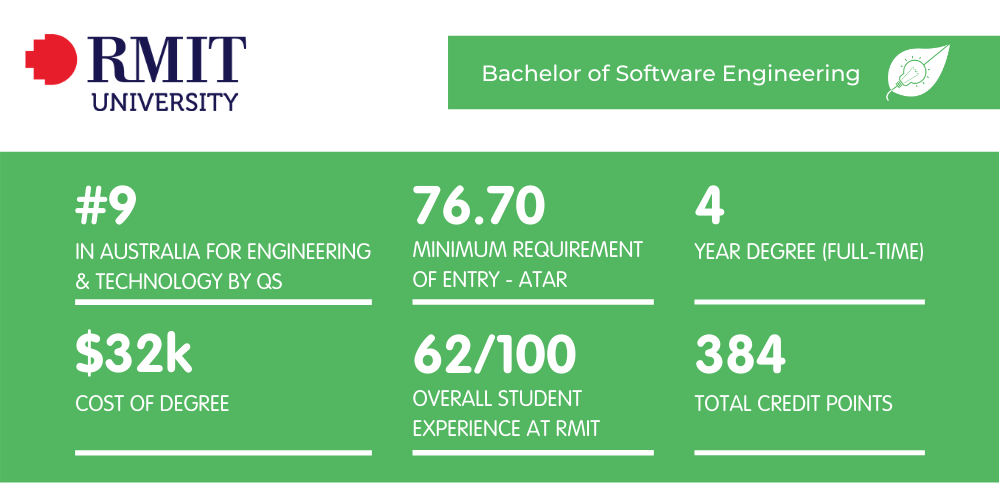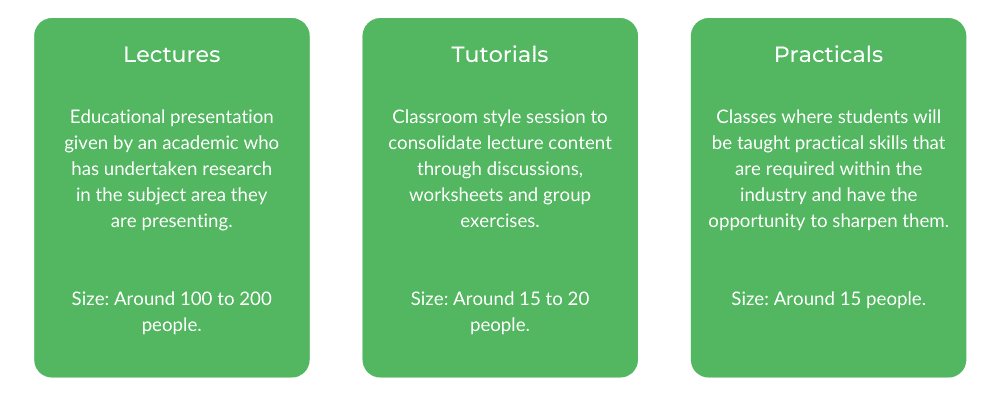What It’s Like Studying a Bachelor of Software Engineering at RMIT

Are you a natural problem-solver? Are you excited about how all the new forms of technology can help businesses and companies across the world? If so, a Bachelor of Software Engineering at RMIT can be a great way to forge your interests into a career!
This article will be covering all that you’ll need to know before applying for this course, so you can figure out if this is the degree for you.
Let’s jump right in!
Mục lục bài viết
What is a Bachelor of Software Engineering at RMIT?
A Bachelor of Software Engineering is a timely undergraduate degree in a world where companies and businesses increasingly rely on mobile technology and software systems. The course can be challenging, but it also ensures its students have a level of industry experience before they graduate!
During the four years of the program, software engineering students cultivate a knowledge of engineering principles, programming and software systems. The course is a combination of computer science and engineering which teaches students to design and create software for a different range of clients.
Successful completion of this degree requires a sharp sense of analytical and problem-solving skills, which will be built upon throughout the RMIT software engineering classes.
As this course and the contact hours is highly intensive, a Bachelor of Software Engineering at RMIT cannot be studied as a double degree.
Career Pathways
The tech industry is growing at a rapid pace and the knowledge gained from graduating a Bachelor of Software Engineering at RMIT can open up a wide range of career opportunities.
Once you enter the industry and a specific job, you might realise that certain parts and skills learned from your course are more relevant for your career than others. For example, while you may not enjoy web developing in university, you may come to enjoy it in your future job!
Some career options include:
-
-
Computer Programmer
-
Software Engineer
-
Software developer
-
Web Developer
-
Systems Engineer
-
Core Units for this Degree
A Bachelor of Software Engineering at RMIT is taught in a mix of core units and electives which are called ‘options’.
First Year
The first year of the course you’ll be completing, like most degrees, introductory units. First-year units teach the fundamentals of computer science, database systems and other skills related to becoming an IT professional.
For example, Programming Techniques covers object-oriented programming using the programming language called Java. The unit Database Concepts contextualises the growing use of computers and the applications of database systems in contemporary settings.
Second Year
After learning the fundamentals, the second year of the course narrows the focus onto units related to software engineering. This mainly consists of intermediary to advanced units on programming.
The practical units Advanced Programming Techniques and Software Engineering: Process and Tools respectively teach programming principles related to software design and the phases of the software engineering life cycle.
Third Year
The third year of a Bachelor of Software Engineering at RMIT is quite exciting as it consists of a year-long industry placement interning at a firm of the student’s choice. This placement requires a minimum of 10 months of full-time work, as well as reporting back to the university on your learning.
Your work in third year translates the first two years of your knowledge into practical knowledge; in doing so, it allows the you to reflect on any gaps or improvements of your skills that you can attend to.

Fourth Year
During the fourth and last year of the course, work experience from the student’s internship is integrated into the unit Software Engineering Project and applies it to a team-based project from inception to implementation.
Electives
A Bachelor of Software Engineering at RMIT doesn’t offer a choice of major, since software engineering is already a specialised area of knowledge. However, Software Engineering Options can be chosen and include:
How to Get into a Bachelor of Software Engineering at RMIT
Entry into this course is very competitive and the ATAR cut-off for a Bachelor of Software Engineering at RMIT is 76.70.
If your ATAR does not meet the cut-off, you firstly should consider whether you are eligible for adjustment points through RMIT’s Subject Adjustments Scheme. For this course, a maximum of four points can be awarded if the applicant has achieved:
-
-
A study score of 35 in English (EAL) equals 1 aggregate point per study
-
A study score of 30 in English other than EAL equals 1 aggregate point per study
-
A study score of 30 in one (but no more than three) of Computing: Software Development, Maths: Mathematical Methods or Maths: Specialist Mathematics equals 1 aggregate point per study
-
There are unfortunately no other alternative pathway options for this course.
Prerequisite Subjects
The prerequisite subjects include:
-
-
Victorian Certificate of Education (VCE) units 3 and 4
-
A study score of at least 30 in English (EAL) or at least 25 in English other than EAL and units 3 and 4
-
A study score of at least 25 in one of Maths: Mathematical Methods or Maths: Specialist Mathematics, or
equivalent studies
-
Scholarships
While there are more than 2000 scholarships offered at RMIT, the most relevant scholarship for commencing software engineering students is the Westpac Young Technologists Scholarship. This offers a value of up to $5000 for any student commencing a technology-related degree, provided they are shortlisted and successful in the selection interview.
The whole list of RMIT scholarships can be found here!
What’s the Teaching Format?
This course is taught in semesters and while there is a wide range of classes, the typical classes include lectures, tutorials and practicals.
Class Structure
Units during the first two years of the program consist of a 2-hour lecture, a 2-hour practical and a 1-hour tutorial per week; some of these classes only have a lecture and a tutorial, or a lecture and a practical. In later years, the classes are less structured.

Lectures
In a Bachelor of Software Engineering at RMIT, lectures generally consist of lecturer-to-student content delivery; however, some lectures have a “flipped classroom” setting where students work on exercises based on the week’s required readings.
These lectures are generally 2 hours long. In the first two years of the course, lectures have a mix of students from IT, Computer Science and other technology-related degrees and therefore have a class size around 100 to 200 students. In the fourth year, classes are specialised and the class size drops to under 50 students.
Tutorials
Tutorials are class-times where students consolidate their theoretical knowledge of the unit, such as coding principles in a coding-related unit. This is often done through weekly worksheets and occasional quizzes.
Tutorials are typically 1 hour long and have 15 to 20 students in attendance.
Practicals
Practicals are where students consolidate their practical knowledge; for example, students practise writing code in a coding-related unit.
Students also use this time to work on assignments and seek help from the tutors. Practicals are generally 2 hours long and have around 15 people.
How much time do you spend in classes?
For a standard semester with 4 units, the contact hours for a Bachelor of Software Engineering at RMIT averages about 20 hours per week
What are the assessments like?
Most assignments in a Bachelor of Software Engineering at RMIT weigh around 40-50% of the student’s unit grade.
For more theory-based units such as Discrete Structures in Computing and Computing Theory, assessments are usually either individual take-home assignments, end-of-semester examinations or a group project that is presented to the class.
For classes that focus on coding and other practical skills, individual and group projects are the main form of assessments. Here, students are given requirements for a system, build it and demonstrate it to a marker in class.
In the fourth year of the course, the unit Software Engineering Project incorporates a group assignment where students work with an industry partner to help develop a software solution for them such as a website or an app.
Skills That You Refine and Learn

The many skills students learn during a Bachelor of Software Engineering at RMIT can be broadly categorised into analytical, problem solving and communicative skills.
Analytical skills relates to going beyond basic programming, coding and other computer science skills. It requires implementing these skills into problem identification and comprehending the different types of IT systems for a various range of users.
Closely related, problem-solving skills within the context of software engineering relates to the ability to design solutions as well as testing and problem-shooting issues during the design process — prototyping is not a linear process and requires going back a few steps in order to reach the finish line!
Lastly, communicative skills are essential for software engineering students and graduates. In both university assessments and in jobs related to technology, projects are worked on in teams and often in an interdisciplinary context. This makes it important to communicate efficiently to both tech professionals and other people who don’t know the specific jargon used in software engineering.
What’s the Faculty and Culture Like?
Faculty
The physical facilities at RMIT are competent since the university recently went through a big renovation; however, as the tech industry evolves very rapidly, some facilities and course material can feel outdated, especially when graduates enter into a technology-related career.
The Software Engineering cohort is small, so it can be quite tight-knit after the early years of the course. For the most part the staff were supportive and helpful, it is however important to note that the cohort is very male-dominated.
Although attitudes are changing for the better, there are experiences in the cohort and faculty wherein certain individuals will undermine the women who study the course. This can come in false remarks such as “women’s brains are just wired differently so they can never be as good in Engineering” or that they’re working with their “boyfriend” in order to do well.
This is not to discourage any women that are passionate and want to pursue a career in the tech industry — knowing your worth, finding the right support systems and raising awareness through university support and societies is all the more important.
Societies
The first step to forming the right support networks during university can be achieved by joining societies at RMIT. The RMIT CSIT Society represents the students in Software Engineering, Computer Science, and associated Information Technology programs.
They offer professional and career development events such as technical workshops, hackathons, and meet-ups before major tech events.
The Females in RMIT Engineering (‘FIRE’) is catered to women interested in engineering generally and offers similar events to the RMIT CSIT Society, as well as more social events like trivia nights, coffee chats and yoga sessions!
Volunteering
Software Engineering students can also mentor high school students through the ‘In2science’ program. In this program, selected students from Victorian universities help out grades 7-10 students in their STEM subjects for 2-3 days and promote awareness of STEM pathways.
While this is a volunteer program, it is nonetheless a great way to polish your CV in the early stages of your career!
Lynn Chen is a Content Writer at Art of Smart Education and is a Communication student at UTS with a major in Creative Writing. Lynn’s articles have been published in Vertigo, The Comma, and Shut Up and Go. In her spare time, she also writes poetry.











